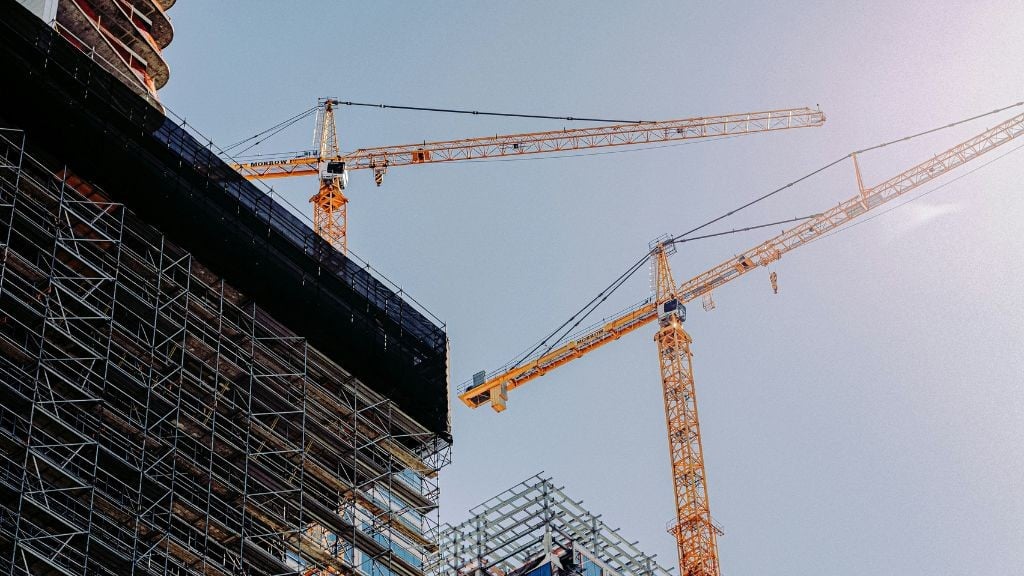Canadian construction leaders get serious about investing in new technologies to match growth
Nine in 10 construction leaders say that advanced technologies are needed to boost productivity and build faster

The Canadian construction industry is facing increasing pressure to build more, and faster. Nine in 10 Canadian construction leaders agree that the industry must move more quickly to embrace advanced technologies, with most saying that digital tools are already boosting productivity, finds a new KPMG in Canada report on digital maturity in the construction industry.
The level of tech investment will need to ramp up given that the industry's labour crunch is expected to worsen as the workforce ages and retirements increase in the next decade, the report points out. Nearly three-quarters (73 percent) of construction leaders expect that it will become "increasingly difficult" to meet demand over the next five-to-10 years, particularly as retirements outpace recruitment.
"The pressure is intensifying on the construction industry to do far more with less," says Jordan Thomson, director, of global infrastructure advisory, KPMG in Canada. "The industry is well aware of their labour conundrum, with eight in 10 companies still experiencing a shortage in skilled labour that's affecting their ability to take on new work and complete current jobs. While it's improved slightly from two years ago, it's still incredibly high."
"The industry is also counting on the removal of interprovincial trade barriers," he adds. "The challenges of working under 14 different sets of provincial rules and regulations is a further and unneeded drag on productivity that needs to be addressed if we expect the industry to be able to handle the growing volume of projects in the pipeline."
Advancements in technology can curb existing issues
The report finds that the industry is focused on deploying a wide range of technologies to improve productivity and expedite project completion, with 81 percent of construction companies saying their recent investments in technology are already making a difference.
Some of these technologies include advancements in modular or prefabrication construction that streamline processes, reduce waste, and accelerate timelines by constructing buildings in a controlled factory environment and then transporting them to the construction site for assembly; robotics and automation, such as robotic bricklaying that improves productivity and safety, or drones for site surveys; and, building information modelling (BIM), which improves planning and collaboration among stakeholders by providing a comprehensive digital view of the project from the architectural design to the materials, systems and infrastructure that will be needed.
Investing in technologies to create a demand-driven supply chain that aligns supply with actual demand was ranked the top priority by more than half (56 percent) of respondents surveyed, the report finds.
"The industry has always faced supply chain challenges, whether it's the cost or availability of materials," Thomson added. "But that's recently been exacerbated by, among other things, U.S. tariffs, ongoing ripple effects from the pandemic, and other global macroeconomic events, prompting many companies to invest in supply chain innovation that uses digital tools, data analytics, and automation that drive real-time visibility into projects and material requirements."
The report shows that industry players are prioritizing a number of new technologies in parallel, spanning from 56 percent exploring demand-driven supply chain innovation to 40 percent exploring robotics, drones, and exoskeletons. More than half are prioritizing prefabrication as well as artificial intelligence (AI) and AI-driven software. Engineering firms and suppliers are focused on deploying intelligent automation, institutional owners are investing in AI, and contractors are prioritizing cybersecurity technologies.
Key survey findings:
- 87 percent of 265 Canadian construction leaders agree the industry will need to implement new and advanced technologies to meet the demand for housing
- 90 percent agree that better tools, such as AI, analytics, BIM, and digital twins, can boost efficiency and labour effectiveness, up from 86 percent in 2023
- 78 percent say procurement processes are changing to encourage innovation and digital adoption
- 43 percent say their clients are "highly influential" in their decision to adopt technology to meet project or contractual requirements
- 73 percent expect it will become "increasingly difficult" to meet demand over the next five-to-10 years, particularly as retirements outpace recruitment
- 78 percent are currently experiencing a shortage of skilled workers, compared to 90 percent in 2023
- 70 percent say the labour crunch is impacting their ability to bid on new projects and/or meet project deadlines, compared to 86 percent in 2023
- 84 percent want to see interprovincial trade barriers eliminated as quickly as possible
- 81 percent say labour productivity and efficiency have improved as a result of their company's recent investments in technology
- 56 percent are prioritizing technologies underpinning a demand-driven supply chain
- 53 percent are making prefabrication and modularization a top or high priority in their business and another 27 percent have it as a mid-level priority
- 53 percent are also prioritizing AI and AI-driven software
"It is good to see that the sector is investing in the technologies that are desperately needed to address persistently poor productivity levels," says Tom Rothfischer, partner and national industry leader, building, construction, and real estate, KPMG in Canada. "These investments are about to pay dividends and transform how we build in Canada. But the current economic and trade environment is squeezing bottom lines, putting at risk much-needed continued spending on tech - technology that is essential if we are to address the chronic housing supply shortage in this country and transform our economy through an ambitious era of nation-building mega-projects."



